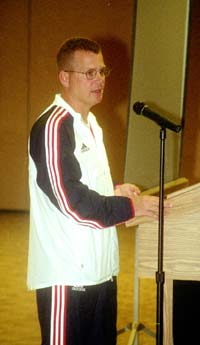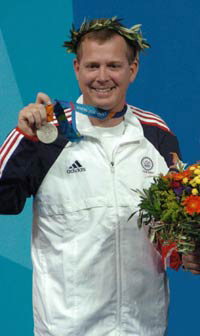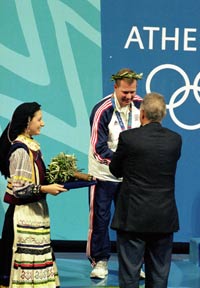 |
| Major Mike Anti told attendees at the National Youth Shooting Sports Leadership Conference “my military experience taught me that I can overcome even when everything seems to be going wrong.”
|
Less than two months after the United States’ successful showing at the Athens Olympics, the 2004 National Youth Shooting Sports Leadership Conference was full of Olympic excitement. The conference, hosted by the CMP and held in partnership with USA Shooting and the NRA, took place in October at Camp Perry, Ohio. It featured several Olympics-related presentations. One of the most compelling and challenging of those presentations was given by the conference keynote speaker 2004 Olympic Silver medalist Major Mike Anti, U. S. Army.
Major Anti, 40, is a member of the Army Marksmanship Unit at Fort Benning, Georgia. In Athens he finished second in the 50 meter three-position rifle competition, in the same event where fellow American Matt Emmons dropped from an almost certain gold medal to eighth place when he fired a crossfire on his last shot of the final round. Anti started that same final in a disadvantageous seventh position among the eight finalists as a result of a major mishap he had on the way to the final. In the kneeling position, the third of the three stages in the qualification round, Anti fired an extra shot and received a two-point penalty. That dropped him from third to seventh at the start of the final.
 |
| Olympic silver medalist Mike Anti was the keynote speaker at the 2004 National Youth Shooting Sports Leadership Conference at Camp Perry. |
And this was not the only adversity that Anti had to overcome. Anti had a history of being a great qualification round shooter who never did well in finals. He described how finals affected him, “in finals, I used to shake uncontrollably.” To overcome this and prepare for the 2004 Olympic Games, Anti worked with U. S. Olympic Committee sport psychologists. He told how he practiced finals every day by using headphones that played back the commands and sounds of finals.
Major Anti said his military assignments outside of the Army Marksmanship Unit also helped to prepare him for success in Athens. “I learned that when everything is going bad, the mission comes first. My military experience taught me that I can overcome even when everything seems to be going wrong. This helped me hold it together in the finals after the two-point penalty.”
 |
| Mike Anti received his silver medal at the Athens Olympics from International Shooting Sport Federation President Olegario Vazquez Raña. Vazquez Raña is a member of the International Olympic Committee.
|
In that fabled Athens Olympic final, he started those last 10 shots in seventh place and worked his way up in the standings until he had a chance to win a medal. It was a 10.4 on his tenth and last shot that moved him into the silver medal position. Ironically, Anti’s final score was 1263.1, less than two points behind Gold medalist Jia Zhanbo of China who finished with 1264.5.
“People have reminded me after the match that if I had not received the two-point penalty that I could have won the gold. I tell them that if I had not shot an 8 in the finals I may have still won the gold, but what does that matter now. There is nothing I can change and I am thrilled to have won the silver,” said Major Anti.
Anti highlighted some great lessons that came out of his Olympic experience. “You don’t have to be perfect, I didn’t execute every shot perfectly, but I stayed focused on my mission, trying to execute every shot as well as I can. If you do that you can recover from your mistakes.”
 |
| Olympic silver medalist Mike Anti is shown here in the standing position as he competed in the 2004 Olympic Games in Athens.
|
To an audience that included 100 of the country’s top junior shooting leaders, Major Anti outlined how his start in a junior rifle club helped get him where he is today. He credits his participation in junior shooting clubs that included the Acorns Junior Rifle Club in Fairfax, Virginia and the Langley Eagles JRC at Langley Air Force Base, Virginia for laying the foundation of his success. Beginning at the age of nine when he first became involved with competitive shooting until he began his collegiate career at the University of West Virginia, junior clubs helped foster his growth.
“These clubs provided me help with equipment, coaching, and competition. They got me into matches every month, but most importantly, these clubs had a plan for advancement. Shooters within the club would graduate through levels as they continued to improve. Also, parents were involved with both their juniors and the programs,” said Major Anti.
Major Anti’s message gave everyone in attendance at the conference encouragement and enthusiasm that is intended to carry over as they return to their junior clubs. His experiences and successes in international competition is a great example of the possibilities and opportunities that a junior shooting club can provide young shooters.
“It takes a lot of support for a junior to find success, and I strongly encourage parents to be involved with their junior’s club. Parents and coaches working together can provide a strong foundation for a young shooter’s future,” Major Anti concluded. |


